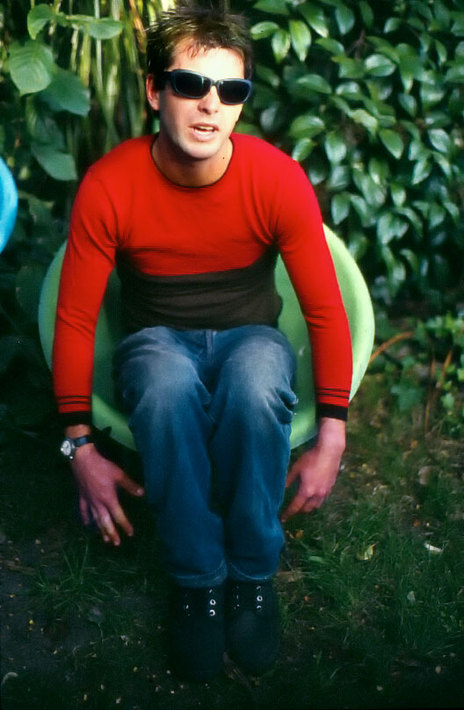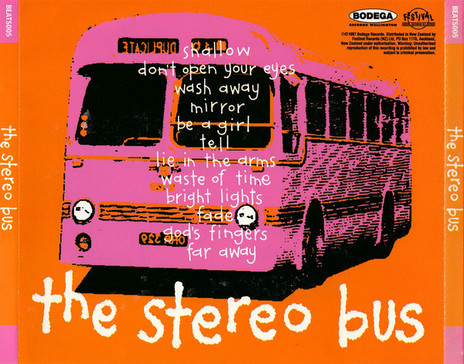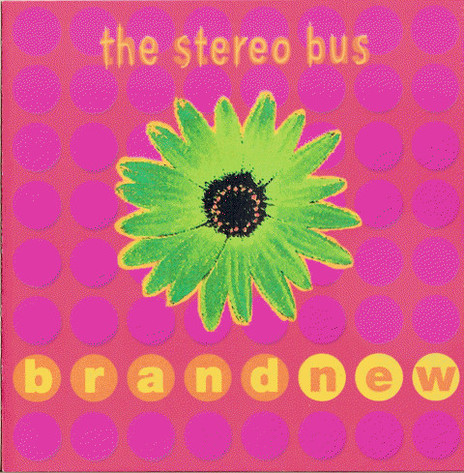Auckland, 1999 – How does a musician who recorded and released a bunch of songs more by default than design, only to discover that the music was bigger and better than he ever dreamed, follow up an album he never really planned to make in the first place? Easy. By simply getting back in the studio again to record another batch of songs that are the equal of every track on the debut album.

David Yetton - Publicity photo
Such is the enviable predicament of former Jean-Paul Sartre Experience founding member Dave Yetton, who started his band The Stereo Bus in September 1997 as a vehicle for the songs he’d been writing over the preceding year.
Two-and-a-half years after releasing the debut, eponymously titled, Stereo Bus album on Wellington-based independent label Beats Bodega, Yetton returns with a new album, aptly titled Brand New, a solid band line-up, a different base, a record deal and even a change in his marital status!
No longer the only permanent member of The Stereo Bus, Yetton has relocated to Auckland from Christchurch, bringing some of the band to Auckland with him. Now signed to EMI following a distribution deal with Festival Records for the first album, what began as more of a hobby for Yetton has become a major endeavour, with singles to release, videos to shoot, tours to plan and, inevitably interviews to be conducted. Which, conveniently, brings us to the story at hand.
I meet up with Yetton and fellow Bus boy Dave Hunt [aka Francis Hunt] in the luxurious corporate surroundings of the EMI board room, located just off Karangahape Road. Once Yetton has made sure his dog Fish (a recent nominee at the 1999 B-Net New Zealand Music Awards in the Best Fox category, an award Yetton himself was nominated for last year) is comfortably settled on the tacky orange executive couch, we settle down to find answers to some pressing questions.

CD tray insert from the debut album by The Stereo Bus, first released by Beats Bodega Records, 1997.
For the first Stereo Bus album, Yetton recorded a bunch of songs with the encouragement of Fraser McInnes of Wellington’s legendary Bar Bodega. After McInnes convinced Yetton to release the songs as an album on his Beats Bodega label, the record seemed to gain a life of its own, slowly but surely infiltrating its way into households and hearts throughout the country.
The album’s noisy, happy, guitar pop seeped out across the airwaves around New Zealand via student radio stations, grabbing the attention of fans of quality songwriting married with heartfelt musicianship. With virtually no marketing or promotion whatsoever, The Stereo Bus rapidly became a band everyone had heard of, thanks to old-fashioned word of mouth. The success of the band’s debut was brilliant in its simplicity and purity.
During the time between Beats Bodega releasing the album and Festival picking it up for national distribution, there was no marketing plan, no gigs, no videos, just a great bunch of songs collected together on a brightly packaged album. At the time the first album was released, Yetton said he had no intention of putting together a band to tour.
As interest and enthusiasm for the album gained momentum, that all changed. Yetton assembled a team of musicians, and The Stereo Bus played their first gigs in September 1997 as the support act for Bic Runga on a national tour. Two years later, a few things have changed.
“Well, yeah, we’re a band now,” laughs Yetton. “I didn’t really have aspirations as such to have a band, or a career. Nothing about this thing is career oriented, People were asking whether The Stereo Bus were going to play live, and it came down to having the right people at the right time. I didn’t think that would really happen, but it did.
“Once we got together as a band and played live, which was when we went on tour with Bic Runga (the first time we played was at The Edge in Christchurch to a full venue), it was terrifying. There was something about it, though. It felt really good playing live.
“At the moment, we’re spread through three different cities, and it can all get really fractured,” Yetton says. “But once we all get in the same room and play our instruments together, it’s magic. It still surprises me how good it sounds when we play. There’s some really good chemistry in the band and I think that is why it went beyond that one night at The Edge. If the chemistry had been bad, it would’ve been a nosedive.’’

David Yetton
The current line-up is a five-piece ensemble comprising Yetton (vocals and guitar), Hunt (guitar), Bobby Kennedy (drums), Mark Beaton (bass) and Jason Fa’afoi (guitar), who has a day job in Wellington as a presenter on kids’ TV show What Now? Apart from Hunt, who was in Supertanker and Pumpkinhead, and Yetton, of course, none of the members of The Stereo Bus have played in prominent bands before.
“That’s sort of what surprised me,” admits Yetton, “because I had the idea in my head that it would be hard to find people to play with in Christchurch who had a similar attitude to it all. And yet, there they were. It’s been so easy for us. It really has. We don’t deserve it at all! You’ve gotta laugh, y’know? That’ll be the end of it now. We’ll be stuffed from now on! We don’t take it too seriously, which I think has made it more enjoyable along the way. Not having these aspirations to do this, that and the other.
“It means you just enjoy the ride.” Hunt concurs, observing that “I’ve been making music for 10 years and I’ve reached the point where, if it happens, it happens. If it doesn’t happen, then I’ll be happy doing other things. For a while, I had all my eggs in one basket. I was really worried that each band I was in had to be a success. And just by letting that go, y’know, things happen.”
Yetton relocated to Auckland about a year ago, both looking for work and to be closer to his betrothed. “It’s not like we moved up here to be close to the music industry,” he says. “That had nothing to do with our decision to move here. I couldn’t justify staying in Christchurch just for the band. Probably 10 years ago, I wouldn’t have done that. But I felt it was quite important to do other things, as well as be in a band.”
Hunt, who moved up to Auckland for a change of scene, agrees that it is important to have a life outside of music because “then you’ve got something to bring to the music.’’
Although the members of The Stereo Bus have been scattered between Auckland, Wellington, and Christchurch over the past few months, spending a lot of time in Auckland anyway between January and April to record the new album at Neil Finn’s Roundhead studio, they’re all gradually converging on the city to base most of the band here permanently.
“It seems to be working okay so far,’’ speculates Yetton. “We’ve made the move and now we enjoy being stuck in traffic.”

The Stereo Bus - Brand New (EMI, 1999)
The second Stereo Bus album, Brand New, evolved as “a pretty natural sort of thing, really,’’ explains Yetton. “It wasn’t some sort of calculated follow-up record or anything. A few of the songs on it came out of the practice room in the Skyline garage we were housed in down in Christchurch. It was this bizarre place. A whole bunch of storage garages.
“There were about 60 of them, all in lines. It was quite cool. You could hear other bands practising on the other side of the place. The other songs were written on four-track. We made an application to Creative New Zealand and we were going to do it that way; but, in their wisdom, they declined us.
“Luckily, at that point, we went on tour with Neil Finn and he said, ‘Well, do it at my place.’ At that point, we didn’t know what we were going to do!” declares Yetton. “We did have some record company interest, but we always wanted to do everything as independently as possible. We didn’t really want to sign a long-term contract with someone just to get the money. Not that Festival or anyone else are demons or anything.
“It’s just that, as a band, I think we’re more comfortable with controlling the means of production as much as possible. I think it’s good to be involved in as many of the steps as you can and retain as much control because that, in the end, is what makes it yours. It’s what’s special about it, that you’ve got your stamp on it. So, the more places you can put that stamp, the better.”
How did the record deal with EMI come about? “We did the record and there had been a number of record companies who had expressed interest since the first record,” recalls Yetton. “So we sent out copies of the new songs to a few different ones and EMI seemed the best option for us. They’ve licensed this album and they’re interested in doing things further down the track. But that’s if things go well and everyone’s still happy. Just one step at a time.
“So often people jump in boots and all without really realising what they’re getting into. Suddenly they’re looking down the barrel of a five-album deal.”
And where does the pursuit of fame and fortune fit into the picture?
‘’The best thing that I’ve ever realised is what a complete crock of shit that is, really,” declares Yetton. “You end up being endlessly disappointed when that success doesn’t arrive. I find that, increasingly I look at the music industry and it’s just appalling, disgusting and laughable.
“Once you realise what a sick joke it all is, you’re not champing at the bit to be involved in it so much. You do it for the music and that’s its own reward. It does take a little while to realise that that’s the way you’ve got to look at it. Perhaps you have to have a few disappointments before you learn that. But I think it’s a really good thing to know.”

David Yetton. - Photo by Murray Cammick
The second album syndrome affects a lot of bands, particularly if their debut is met with widespread acclaim. Is Yetton happy with his band’s follow-up album?
“When you make a record, you don’t ever know what you’re going to come out with,” he philosophises. “You just ride the beast while you’re doing it. There were magic moments which we managed to capture and I think that’s really important. It’s really hard to judge your own music when you’re that close to it. I put it on every now and then, when I can pluck up the courage, and I enjoy it, so that’s got to be a good thing. If you try too hard to make a good record, you’ll never make a good record. You’ve just got to go with the flow. Exercise a bit of judgement along the way too but, at the end of the day, you do just have to give it a bash.”
Yetton admits that his songwriting has changed considerably since his days in JPSE. “It’s less angsty. That’s to do with getting a little bit wiser and a little less frustrated about things, you know? When you’re young, your emotions are running rampant and you’re really driven by them. And that’s really good. But once you’ve let your emotions drag you up and down the road and crash you into a few cars and things, you realise that, hold on, I can’t have these things drag me around too much any more.
“I reckon, as someone who writes songs, it’s quite a juggling act because you are really reliant on emotions. You need to be able to access them. It’s your stock-in-trade, basically. But, at the same time, you’ve got to learn to keep a lid on it sometimes and not let it run your life.
“I remember, years ago, walking down Queen Street and being dragged up into the Scientologists’ office to do a personality test,” laughs Yetton. “And they said, ‘Until you get your emotional life under control, you’re never going to get anywhere.’ It haunted me! Then I figured out, about 10 years later, that they told that to everybody!
“I tend to write a lot about affairs of the heart, much to my own downfall, in some ways, in as far as being a little too open for some people’s interpretations,” continues Yetton.
“But I have to basically write about things that mean a lot to me. That’s quite hard for me sometimes, and for the people closely involved in it as well. You feel like it’s dragged out for other people’s inspection. But, at this point, I don’t know of any other way of doing it or if I’d want any other way of doing it. I feel it’s quite important to be truly involved in the matters you’re writing about. I can’t really inject quite that same sort of feeling into the clubbing of fur seals or something, otherwise I’d write about that. It’s not that I don’t care about the fur seals but it doesn’t quite impact on my personal life the same!
“On a really basic level, I think I write music because it excites my soul, you know? There are just those moments when that tingle goes up your spine and you go, ‘Woah!’ It’s as close to some sort of spiritual ecstasy that you can get.
“I remember, as a 16-year-old, I used to live in the country and I’d go out for these walks at night, with my Bowie or Sex Pistols or Echo & the Bunnymen or whatever playing. And there’d be the moon and the stars and the trees and I’d have this music going and it would feel like, ‘Oh, it doesn’t get any better than this! I’m just going to grow wings and fly away!’ It takes you that much by the heart, or the soul. And there’s nothing like it! It’s so pure! At the end of the day, that’s what it’s all about. And it doesn’t have to be like ‘spiritual’ music. It just has to be something that’s raw, emotional, that has intensity that just lifts you into some other space.”
Future plans for The Stereo Bus are vague at the moment, beyond promoting the new album and the next single, ‘Birthday’, and going on tour in November. “We don’t really have any plans,” admits Yetton. “We don’t really believe in them! We’d like to sell some records. That’d be a good idea, I guess. Now there’s a concept! My plans at the moment are to head back to Mt Eden and eat the tom yum soup I put on the stove.”
As the conversation draws to a close, I’m reminded of a song by another Christchurch outfit, Salmonella Dub, who won the B-Net award for best album in September (The Stereo Bus won the same award in 98). Even with all the changes in the world of Dave Yetton and The Stereo Bus, the acclaim, the major label, the new album, the big city, the marriage, even they’re still very much playing music “for the love of it”.
Surely, that’s the best reason of all. Fame and fortune don’t enter into it. It’s simply about making good music.
– First published in Pavement magazine, October/November 1999, and collected in Peter McLennan’s I Believe You Are a Star: interviews with New Zealand musicians, DJs, and artists (Dunbar Noone, 2013)
--
Update: David Yetton gathered a new Stereo Bus around him in Auckland in 2011, with Francis Hunt from the original Stereo Bus and Mike Hall (The Brunettes, Pluto), Michael Franklin-Browne (Head Like A Hole, Pluto) and Matthias Jordan (Nightchoir, Pluto) and Nick Buckton (Voom, Sidekick Nick, Augustino, Polaar). They released the ‘www.Leather.Boots’ single and stepped out live again, with shows in Auckland and Wellington, and landing the opening slot for Dean Wareham (of Galaxie 500 and Luna) in Auckland in October that year.